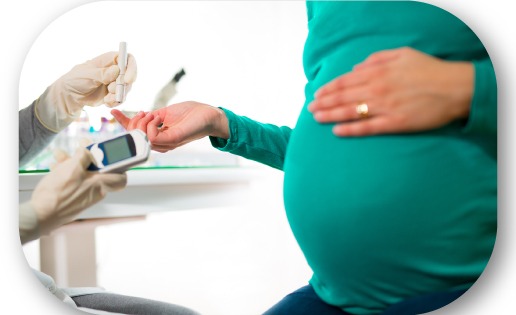
During pregnancy, women may develop high blood sugar levels. This condition is considered gestational diabetes mellitus (GDM) or gestational diabetes which usually develops between the 24th and 28th weeks of pregnancy.
If you develop gestational diabetes while you are pregnant, it does not mean that you have diabetes before or during your pregnancy. It can increase the risk of developing type 2 diabetes in the future. If not handled properly, it can increase the likelihood of your child developing diabetes and complications for you and your baby during pregnancy and childbirth.
However, another good thing to note is that gestational diabetes goes away after delivery. But it’s necessary to take blood sugar tests as you might be at higher risk of getting diabetes.
Some common symptoms of gestational diabetes
It is rare that gestational diabetes causes symptoms. Here are some common symptoms, which are mild. These may include:
- Fatigue
- Blurred vision
- Excessive thirst
- Excessive need for urination
- Yeast infections
Causes
The exact cause of gestational diabetes is unknown, but hormones play a role. When you are pregnant, your body produces a large number of certain hormones, including human placental lactogen (hPL) and Other hormones that increase insulin resistance.
These hormones affect your placenta and help to sustain your pregnancy. Over a period of time, the amount of these hormones in your body increases. They can begin to make your body resistant to insulin.
Insulin helps move glucose from your blood to your cells, where it is used for energy. During pregnancy, your body naturally becomes slightly insulin resistant, causing more glucose available in your bloodstream to pass to the baby. If insulin resistance is too strong, your blood glucose levels may rise abnormally leading to gestational diabetes.
Learn who’s at risk for gestational diabetes
You are at a higher risk of developing gestational diabetes if you have;
- High blood pressure
- Have a family history of diabetes
- You were overweight before you became pregnant
- Get more weight than normal when you are pregnant
- Expecting multiple children
- Given birth to a baby weighing more than 9 pounds
- Previously had gestational diabetes
- Have an unexplained abortion or stillbirth
- Drank steroids such as glucocorticoids
- Have polycystic ovary syndrome (PCOS), acanthosis nigricans, or other conditions related to insulin resistance
Treatment
To avoid any problems when having gestational diabetes during pregnancy, it’s better to follow a healthy routine to reduce blood sugar levels.
- A healthy diet that is rich in vitamins and not processed foods.
- Moderate exercises regularly will keep you fit.
- Testing your blood sugar levels regularly, or urine tests to check out if diabetes is under control.
Even with these treatments, you’ll be closely monitored during your pregnancy period and delivery time to check for any complications. If your blood sugar isn’t controlled, it’s recommended for pregnant mothers to give birth early.
Pregnancy diabetes cannot be completely prevented. However, adopting health-promoting practices can help reduce your chances of developing your condition. If you are pregnant and have one of the risk factors for gestational diabetes, try eating a nutritious diet and getting regular exercise. Light activity such as a walk is also beneficial.
If you are planning to get pregnant in the next few days and you are overweight, consider preparing for your pregnancy by talking to a health professional about ways to safely lose extra weight.
They can help you create a proper diet plan to reach and maintain a moderate weight. Losing a certain amount of weight can also help reduce the risk of diabetes in your pregnancy.
If you have any queries related to gestational diabetes, visit the best maternity care hospital in Indiranagar.
